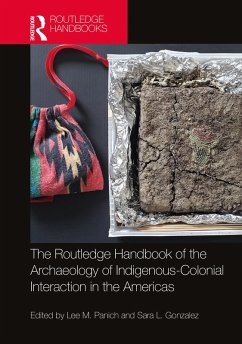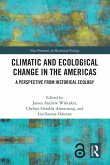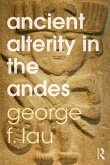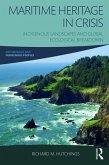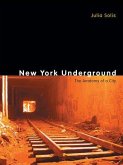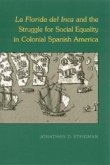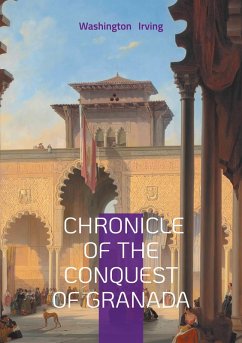Routledge Handbook of the Archaeology of Indigenous-Colonial Interaction in the Americas
Herausgeber: Panich, Lee M; Gonzalez, Sara L
Routledge Handbook of the Archaeology of Indigenous-Colonial Interaction in the Americas
Herausgeber: Panich, Lee M; Gonzalez, Sara L
- Broschiertes Buch
- Merkliste
- Auf die Merkliste
- Bewerten Bewerten
- Teilen
- Produkt teilen
- Produkterinnerung
- Produkterinnerung
The Routledge Handbook of the Archaeology of Indigenous-Colonial Interaction in the Americas brings together scholars from across the hemisphere to examine how archaeology can highlight the myriad ways that Indigenous people have negotiated colonial systems from the fifteenth century through to today.
Andere Kunden interessierten sich auch für
![Climatic and Ecological Change in the Americas Climatic and Ecological Change in the Americas]() Climatic and Ecological Change in the Americas53,99 €
Climatic and Ecological Change in the Americas53,99 €![Ancient Alterity in the Andes Ancient Alterity in the Andes]() George F LauAncient Alterity in the Andes58,99 €
George F LauAncient Alterity in the Andes58,99 €![Maritime Heritage in Crisis Maritime Heritage in Crisis]() Richard M HutchingsMaritime Heritage in Crisis60,99 €
Richard M HutchingsMaritime Heritage in Crisis60,99 €![New York Underground New York Underground]() Julia SolisNew York Underground45,99 €
Julia SolisNew York Underground45,99 €![La Florida del Inca and the Struggle for Social Equality in Colonial Spanish America La Florida del Inca and the Struggle for Social Equality in Colonial Spanish America]() Jonathan D. SteigmanLa Florida del Inca and the Struggle for Social Equality in Colonial Spanish America25,99 €
Jonathan D. SteigmanLa Florida del Inca and the Struggle for Social Equality in Colonial Spanish America25,99 €![Chronicle Of The Conquest Of Granada Chronicle Of The Conquest Of Granada]() Washington IrvingChronicle Of The Conquest Of Granada16,99 €
Washington IrvingChronicle Of The Conquest Of Granada16,99 €![The Cambridge History of the Age of Atlantic Revolutions 3 Hardback Book Set The Cambridge History of the Age of Atlantic Revolutions 3 Hardback Book Set]() The Cambridge History of the Age of Atlantic Revolutions 3 Hardback Book Set397,99 €
The Cambridge History of the Age of Atlantic Revolutions 3 Hardback Book Set397,99 €-
-
-
The Routledge Handbook of the Archaeology of Indigenous-Colonial Interaction in the Americas brings together scholars from across the hemisphere to examine how archaeology can highlight the myriad ways that Indigenous people have negotiated colonial systems from the fifteenth century through to today.
Produktdetails
- Produktdetails
- Verlag: Taylor & Francis
- Seitenzahl: 554
- Erscheinungstermin: 9. Januar 2023
- Englisch
- Abmessung: 244mm x 173mm x 30mm
- Gewicht: 1379g
- ISBN-13: 9781032021119
- ISBN-10: 103202111X
- Artikelnr.: 73400968
- Herstellerkennzeichnung
- Libri GmbH
- Europaallee 1
- 36244 Bad Hersfeld
- gpsr@libri.de
- Verlag: Taylor & Francis
- Seitenzahl: 554
- Erscheinungstermin: 9. Januar 2023
- Englisch
- Abmessung: 244mm x 173mm x 30mm
- Gewicht: 1379g
- ISBN-13: 9781032021119
- ISBN-10: 103202111X
- Artikelnr.: 73400968
- Herstellerkennzeichnung
- Libri GmbH
- Europaallee 1
- 36244 Bad Hersfeld
- gpsr@libri.de
Lee M. Panich is an associate professor of anthropology at Santa Clara University. In his research, he employs a combination of archaeological, ethnographic, and archival data to examine the long-term entanglements between California's Indigenous societies and colonial institutions, particularly the Spanish mission system. Sara L. Gonzalez is an associate professor of anthropology at the University of Washington and Curator of Archaeology the Burke Museum of Natural History and Culture. An anthropological archaeologist by training, she works at the intersection of Indigenous studies, tribal historic preservation, and public history.
Part I: Methodological and Theoretical Foundations; 1. Situating
Archaeological Approaches to Indigenous-Colonial Interaction in the
Americas: An Introduction; 2. Deep Histories and the Archaeology of
Colonialism; 3. A Double Coloniality: The Modern/Colonial Underpinnings of
Mission Archaeology in South America; 4. Colonialism and Indigenous
Population Decline in the Americas; 5. Climate and Colonialism in the
Americas: Comparing Exemplary Cases; 6. Colonialism and Historical Ecology:
Livestock Management as a Case Study in the American Southwest; 7.
Interpreting Documentary and Archaeological Evidence: Intercultural
Interactions in Santafé de Bogotá (Colombia); 8. Theorizing
Indigenous-Colonial Interactions in the Americas; Part II: Core Issues and
Topics; 9. Pathways to Persistence: Divergent Native Engagements with
Sustained Colonial Permutations in North America; 10. African-Indigenous
Interactions in Colonial America: From Divisions to Dialogue; 11.
Indigenous Negotiations of Missionization and Religious Conversion; 12.
Labor and Natural Resource Extraction in Spanish Colonial Contexts; 13.
Objects of Change? Revisiting Native Material Culture and Technological
Traditions in the Post-1492 Americas; 14. The Archaeology of Conquest and
Accommodation: A View from the Valley of Mexico; Part III: Archaeological
Explorations of Native-Lived Colonialisms; 15. Social Networks and Colonial
Adaptation in the Caribbean; 16. Indigenous Persistence in the Face of
Imperialism: Andean Case Studies; 17. Reconceptualizing the Wichita Middle
Ground in the Southern Plains; 18. Indios Bárbaros: Nomad-Spanish
Interactions on the Northern Frontier of New Spain; 19. Indigenous Agency
and Limits to the Colonial Order in South America; 20. Landscapes of
Strategic Mobility in Central America: San Pedro Siris During the Caste
War; 21. The Adorned Body in French Colonial Louisiana: Exploring
Cosmopolitan Materialities of Bodily Objects; 22. "Politics of Regard" and
the Meaning of Things: The Persistence of Ceramic and Agroforestry
Practices by Women in São Paulo; 23. From Hybridity to Relationality:
Shifting Perspectives on the Archaeology of Métis Emergence; 24. Battling
the Alamo: Toward Preservation and Protection of Coahuiltecan Legacies and
Camposantos; 25. Lived Heritage of Colonialism at Tahcabo, Yucatán, México;
26. Monumentalizing Nipmuc Heritage and Emplacing Indigenous Presence;
Part IV: Decolonial Futures; 27. In Small Islands Forgotten: Lessons from
Chamorro Lands; 28. Unsettling the Archaeology of Reservations: A View from
Grand Ronde, Oregon; 29. Survivance Storytelling in Archaeology; 30. The
Hoofed Clan Story and Storywork: Red Lake Ojibwe Foodways and Indigenous
Food Sovereignty; 31. Indigenous Archaeological Approaches and the Refusal
of Colonialism in Archaeology; 32. The Limits of Repatriation's
Decolonizing Abilities; 33. Changing Museum Narratives: A Conversation with
Culture Curators at the Burke Museum of Natural History and Culture
Archaeological Approaches to Indigenous-Colonial Interaction in the
Americas: An Introduction; 2. Deep Histories and the Archaeology of
Colonialism; 3. A Double Coloniality: The Modern/Colonial Underpinnings of
Mission Archaeology in South America; 4. Colonialism and Indigenous
Population Decline in the Americas; 5. Climate and Colonialism in the
Americas: Comparing Exemplary Cases; 6. Colonialism and Historical Ecology:
Livestock Management as a Case Study in the American Southwest; 7.
Interpreting Documentary and Archaeological Evidence: Intercultural
Interactions in Santafé de Bogotá (Colombia); 8. Theorizing
Indigenous-Colonial Interactions in the Americas; Part II: Core Issues and
Topics; 9. Pathways to Persistence: Divergent Native Engagements with
Sustained Colonial Permutations in North America; 10. African-Indigenous
Interactions in Colonial America: From Divisions to Dialogue; 11.
Indigenous Negotiations of Missionization and Religious Conversion; 12.
Labor and Natural Resource Extraction in Spanish Colonial Contexts; 13.
Objects of Change? Revisiting Native Material Culture and Technological
Traditions in the Post-1492 Americas; 14. The Archaeology of Conquest and
Accommodation: A View from the Valley of Mexico; Part III: Archaeological
Explorations of Native-Lived Colonialisms; 15. Social Networks and Colonial
Adaptation in the Caribbean; 16. Indigenous Persistence in the Face of
Imperialism: Andean Case Studies; 17. Reconceptualizing the Wichita Middle
Ground in the Southern Plains; 18. Indios Bárbaros: Nomad-Spanish
Interactions on the Northern Frontier of New Spain; 19. Indigenous Agency
and Limits to the Colonial Order in South America; 20. Landscapes of
Strategic Mobility in Central America: San Pedro Siris During the Caste
War; 21. The Adorned Body in French Colonial Louisiana: Exploring
Cosmopolitan Materialities of Bodily Objects; 22. "Politics of Regard" and
the Meaning of Things: The Persistence of Ceramic and Agroforestry
Practices by Women in São Paulo; 23. From Hybridity to Relationality:
Shifting Perspectives on the Archaeology of Métis Emergence; 24. Battling
the Alamo: Toward Preservation and Protection of Coahuiltecan Legacies and
Camposantos; 25. Lived Heritage of Colonialism at Tahcabo, Yucatán, México;
26. Monumentalizing Nipmuc Heritage and Emplacing Indigenous Presence;
Part IV: Decolonial Futures; 27. In Small Islands Forgotten: Lessons from
Chamorro Lands; 28. Unsettling the Archaeology of Reservations: A View from
Grand Ronde, Oregon; 29. Survivance Storytelling in Archaeology; 30. The
Hoofed Clan Story and Storywork: Red Lake Ojibwe Foodways and Indigenous
Food Sovereignty; 31. Indigenous Archaeological Approaches and the Refusal
of Colonialism in Archaeology; 32. The Limits of Repatriation's
Decolonizing Abilities; 33. Changing Museum Narratives: A Conversation with
Culture Curators at the Burke Museum of Natural History and Culture
Part I: Methodological and Theoretical Foundations; 1. Situating
Archaeological Approaches to Indigenous-Colonial Interaction in the
Americas: An Introduction; 2. Deep Histories and the Archaeology of
Colonialism; 3. A Double Coloniality: The Modern/Colonial Underpinnings of
Mission Archaeology in South America; 4. Colonialism and Indigenous
Population Decline in the Americas; 5. Climate and Colonialism in the
Americas: Comparing Exemplary Cases; 6. Colonialism and Historical Ecology:
Livestock Management as a Case Study in the American Southwest; 7.
Interpreting Documentary and Archaeological Evidence: Intercultural
Interactions in Santafé de Bogotá (Colombia); 8. Theorizing
Indigenous-Colonial Interactions in the Americas; Part II: Core Issues and
Topics; 9. Pathways to Persistence: Divergent Native Engagements with
Sustained Colonial Permutations in North America; 10. African-Indigenous
Interactions in Colonial America: From Divisions to Dialogue; 11.
Indigenous Negotiations of Missionization and Religious Conversion; 12.
Labor and Natural Resource Extraction in Spanish Colonial Contexts; 13.
Objects of Change? Revisiting Native Material Culture and Technological
Traditions in the Post-1492 Americas; 14. The Archaeology of Conquest and
Accommodation: A View from the Valley of Mexico; Part III: Archaeological
Explorations of Native-Lived Colonialisms; 15. Social Networks and Colonial
Adaptation in the Caribbean; 16. Indigenous Persistence in the Face of
Imperialism: Andean Case Studies; 17. Reconceptualizing the Wichita Middle
Ground in the Southern Plains; 18. Indios Bárbaros: Nomad-Spanish
Interactions on the Northern Frontier of New Spain; 19. Indigenous Agency
and Limits to the Colonial Order in South America; 20. Landscapes of
Strategic Mobility in Central America: San Pedro Siris During the Caste
War; 21. The Adorned Body in French Colonial Louisiana: Exploring
Cosmopolitan Materialities of Bodily Objects; 22. "Politics of Regard" and
the Meaning of Things: The Persistence of Ceramic and Agroforestry
Practices by Women in São Paulo; 23. From Hybridity to Relationality:
Shifting Perspectives on the Archaeology of Métis Emergence; 24. Battling
the Alamo: Toward Preservation and Protection of Coahuiltecan Legacies and
Camposantos; 25. Lived Heritage of Colonialism at Tahcabo, Yucatán, México;
26. Monumentalizing Nipmuc Heritage and Emplacing Indigenous Presence;
Part IV: Decolonial Futures; 27. In Small Islands Forgotten: Lessons from
Chamorro Lands; 28. Unsettling the Archaeology of Reservations: A View from
Grand Ronde, Oregon; 29. Survivance Storytelling in Archaeology; 30. The
Hoofed Clan Story and Storywork: Red Lake Ojibwe Foodways and Indigenous
Food Sovereignty; 31. Indigenous Archaeological Approaches and the Refusal
of Colonialism in Archaeology; 32. The Limits of Repatriation's
Decolonizing Abilities; 33. Changing Museum Narratives: A Conversation with
Culture Curators at the Burke Museum of Natural History and Culture
Archaeological Approaches to Indigenous-Colonial Interaction in the
Americas: An Introduction; 2. Deep Histories and the Archaeology of
Colonialism; 3. A Double Coloniality: The Modern/Colonial Underpinnings of
Mission Archaeology in South America; 4. Colonialism and Indigenous
Population Decline in the Americas; 5. Climate and Colonialism in the
Americas: Comparing Exemplary Cases; 6. Colonialism and Historical Ecology:
Livestock Management as a Case Study in the American Southwest; 7.
Interpreting Documentary and Archaeological Evidence: Intercultural
Interactions in Santafé de Bogotá (Colombia); 8. Theorizing
Indigenous-Colonial Interactions in the Americas; Part II: Core Issues and
Topics; 9. Pathways to Persistence: Divergent Native Engagements with
Sustained Colonial Permutations in North America; 10. African-Indigenous
Interactions in Colonial America: From Divisions to Dialogue; 11.
Indigenous Negotiations of Missionization and Religious Conversion; 12.
Labor and Natural Resource Extraction in Spanish Colonial Contexts; 13.
Objects of Change? Revisiting Native Material Culture and Technological
Traditions in the Post-1492 Americas; 14. The Archaeology of Conquest and
Accommodation: A View from the Valley of Mexico; Part III: Archaeological
Explorations of Native-Lived Colonialisms; 15. Social Networks and Colonial
Adaptation in the Caribbean; 16. Indigenous Persistence in the Face of
Imperialism: Andean Case Studies; 17. Reconceptualizing the Wichita Middle
Ground in the Southern Plains; 18. Indios Bárbaros: Nomad-Spanish
Interactions on the Northern Frontier of New Spain; 19. Indigenous Agency
and Limits to the Colonial Order in South America; 20. Landscapes of
Strategic Mobility in Central America: San Pedro Siris During the Caste
War; 21. The Adorned Body in French Colonial Louisiana: Exploring
Cosmopolitan Materialities of Bodily Objects; 22. "Politics of Regard" and
the Meaning of Things: The Persistence of Ceramic and Agroforestry
Practices by Women in São Paulo; 23. From Hybridity to Relationality:
Shifting Perspectives on the Archaeology of Métis Emergence; 24. Battling
the Alamo: Toward Preservation and Protection of Coahuiltecan Legacies and
Camposantos; 25. Lived Heritage of Colonialism at Tahcabo, Yucatán, México;
26. Monumentalizing Nipmuc Heritage and Emplacing Indigenous Presence;
Part IV: Decolonial Futures; 27. In Small Islands Forgotten: Lessons from
Chamorro Lands; 28. Unsettling the Archaeology of Reservations: A View from
Grand Ronde, Oregon; 29. Survivance Storytelling in Archaeology; 30. The
Hoofed Clan Story and Storywork: Red Lake Ojibwe Foodways and Indigenous
Food Sovereignty; 31. Indigenous Archaeological Approaches and the Refusal
of Colonialism in Archaeology; 32. The Limits of Repatriation's
Decolonizing Abilities; 33. Changing Museum Narratives: A Conversation with
Culture Curators at the Burke Museum of Natural History and Culture

